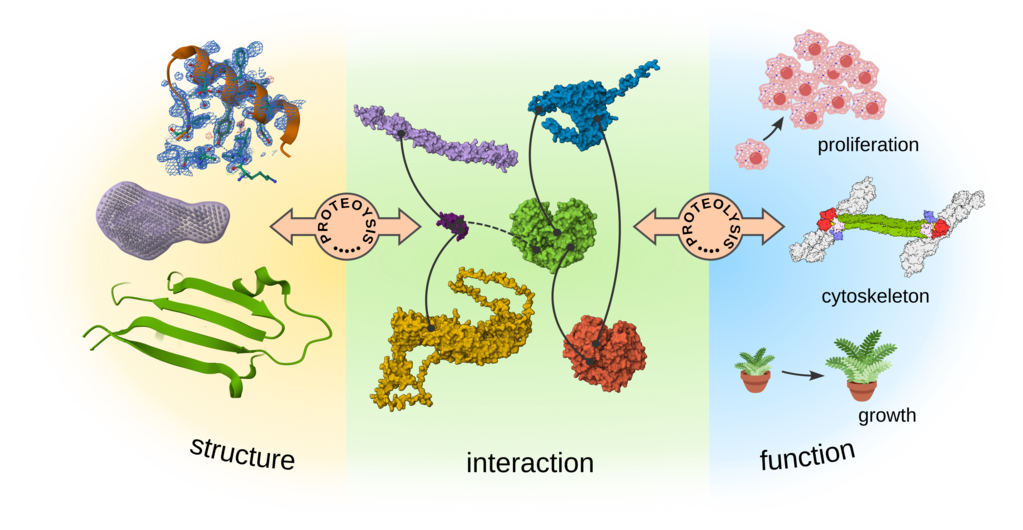Proteolysis and its regulation in health and disease
P1-0140
Duration: 1.1.2015 - 31.12.2021
Head:
prof. ddr.
Turk Boris
Head at FKKT:
izr. prof. dr.
Pavšič Miha

Researchers at UL FKKT who are part of the program group P1-0140 are members of the Chair of Biochemistry. We are engaged in structural and functional research of proteins that perform various roles such as cellular signaling and cytoskeleton construction, and are through their functional aspects involved in a wide field of proteolysis. This involves either the regulation of their function and the generation of fragments with distinct roles and protein–protein interactions, or their altered susceptibility to proteolytic degradation due to factors like post-translational modifications. Understanding these processes is important from the perspective of basic science and has practical value, for example, in developing therapies for diseases in which the studied human proteins are involved.
We highlight a few proteins that are at the center of our attention:
- Tumor markers EpCAM and Trop2, transmembrane proteins that are important for normal development of epithelial tissues, and are overexpressed in cancers of epithelial origin – carcinomas. We were the first to determine the structures of both, now we focus mainly on their proteolytic cleavages by proteases such as TACE and BACE and interactions with other proteins. We are also interested in signaling-related interactions of their fragments, for example, interactions of the cytosolic part with the FHL2:beta-catenin complex. Research is important for understanding their involvement in the epithelial–mesenchymal transition and the development of diagnostic and prognostic approaches.
- Non-muscle alpha-actinins, which are key to connecting actin filaments into 3D structures such as networks and bundles and for dynamic switching between them. Here, proteolytic cleavage by calpains affects the alpha-actinin:actin interaction. We are currently focusing on the regulation of actin-binding activity of alpha-actinins with calcium ions, mainly from a structural point of view. Research is important in terms of understanding the functions of the spectrin superfamily of proteins and the stability and dynamics of the cytoskeleton, as well as in terms of understanding the molecular basis of mutations associated with diseases such as macrothrombocytopenia and focal segmental glomerulosclerosis.
- Iodination of various plant proteins and the impact of this post-translational modification on their function and susceptibility to degradation with proteases. Results have potential to contribute to the understanding of molecular mechanisms involved in growth and immune response of plants.
To investigate the mentioned aspects of the studied macromolecules we use a wide range of approaches, from the preparation of proteins in different systems (bacterial, insect, mammalian cells) and their isolation using chromatographic methods to biochemical and biophysical characterization (spectroscopic methods such as fluorimetry, UV-Vis and CD spectroscopy; calorimetric methods (ITC); light scattering techniques (RALLS/LALLS, SAXS)). We also use various approaches to identify and characterize protein–protein interactions. All this is combined with structural research of proteins, within which we utilize molecular modeling, molecular dynamics simulations and determination of structure by experimental approaches (X-ray crystallography, cryo-electron microscopy and NMR spectroscopy, the latter in connection with other groups), and we also integrate complementary data obtained using other experimental or bioinformatics approaches.
Program group associates are actively involved in the teaching process at UL FKKT, both in terms of lectures and practicals as well as mentoring, through which we pass on knowledge and experience to new generations of students. Through participation in various committees, societies and consortia, we are active in the Slovenian research environment, and through collaborations we are also involved in international research community.
P1-0140 programme group members (at UL FKKT)
izr. prof. dr. Pavšič Miha
doc. dr. Taler-Verčič Ajda
Young Researchers: asist. Logonder Tina